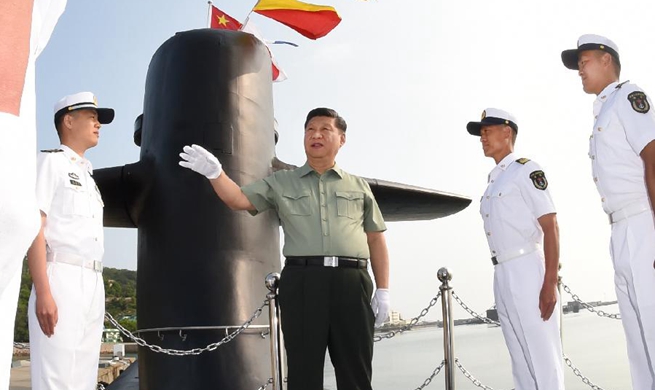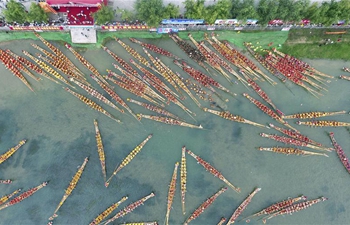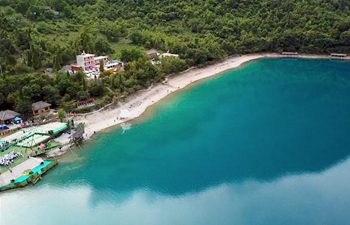by Xinhua writer Li Bo, Zhou Siyu, Li Zhen
BEIJING, June 17 (Xinhua) -- Since the beginning of this year, the situation in the Middle East has been evolving dramatically and mainly around four pivots -- the Iran nuclear issue, renewed Palestinian-Israeli conflicts, the Syria war and fighting in Yemen.
Big regional powers such as Iran, Israel, Saudi Arabia and Turkey were flexing their muscles to contain each other and gain more leverage and space in the geopolitical turbulence.
IRAN UNDER PRESSURE
The prospects for the Iran nuclear issue became unclear after the United States announced in May that it was pulling out of the 2015 deal that restricted Iran's nuclear program in exchange for the removal of economic sanctions.
Iran has been put under a lot of external pressure as both European and Asian clients might stop importing Iranian oil or doing business with the country amid fears they will be targeted by U.S. sanctions.
Analysts said that even though Iran was making great efforts to persuade other signatory nations of the 2015 nuclear deal -- Russia, China, Germany, Britain and France -- to preserve the 2015 deal, the possibility is very slim.
European companies are unlikely to continue cooperating with Iran under the risk of being subject to U.S. sanctions.
Yet Iran is heavily dependent on the U.S. dollar in foreign trade. It has long used the dollar in its oil trade settlement.
Militarily, Israel has been squeezing Iran's strategic space in Syria and the Saudi-led coalition forces reinforced assaults against the Iran-allied Houthi forces.
Under all this pressure, the hardliners have gained an upper hand in Iran.
In early June, Iran threatened to start boosting its enriched uranium capacity and build advanced centrifuges.
Iran's supreme leader Ayatollah Ali Khamenei said that it seems "some European governments expect the Iranian nation to both put up with sanctions and give up its nuclear activities."
The Iranian leader said Iran would not tolerate sanctions nor undergo "nuclear austerity."
ISRAEL: WAITING TO ACT
As the conflict with the Palestinians cooled down, Israel's enmity with Iran has taken the upper hand over its feud with the Arab world, which has already been divided internally.
It was even emboldened by the Trump administration's decision to move the U.S. embassy from Tel Aviv to Jerusalem on May 14 after President Donald Trump's recognition of the holy city as the capital of Israel, which Palestinians rejected.
In recent meetings with leaders of Russia, Germany, France and Britain, Israeli Prime Minister Benjamin Netanyahu tried to nudge them to take a harder stance on Iran, saying the 2015 nuclear deal was too soft on Iran.
Dr. Ofer Israeli, a member of the Institute for Policy and Strategy (IPS) at the Interdisciplinary Center (IDC) in Herzliya, Israel, said Israel believes that Iran was attacking Israeli interests through proxies in Syria, Lebanon and Gaza.
He said that direct conflict with Iran does not serve Israel's interests, so Israel does not want an escalation in the Gaza Strip but will keep attacking Iranian interests in Syria.
SAUDI ARABIA: TOUGH STANCE
Saudi Arabia, an economic powerhouse in the Arab world and a leading Sunni Muslim power in the Middle East, has been locked in a fierce struggle for regional dominance with Iran in recent years.
The Saudi-led coalition has recently sent hundreds of troops to Yemen's western coast in preparation for the advancement into Houthi-held Hodeidah, a long-time key military target declared by the coalition.
The coalition intervened in Yemen in March 2015 to support President Abd-Rabbu Mansour Hadi against the Iranian-backed Houthi forces and roll back Iran's influence.
The worst diplomatic crisis in decades -- Saudi Arabia's breaking off relations with Qatar -- may not be tackled in the short run.
Saudi Arabia, the United Arab Emirates (UAE), Bahrain and Egypt announced last June they would sever ties with Qatar, accusing Doha of supporting terrorism and interfering in their internal affairs and aligning with Iran against Arab interests, while Qatar denied the allegations.
The recent years have witnessed a thaw in Saudi-Israeli relations due to Iran.
With the economic weakening of Iran, Saudi Arabia and Israel seek to seize the chance to curtail Iran's influence in the region and its support for proxies and allies including Hezbollah in Lebanon and Syria, Shiite militias in Iraq and Houthis in Yemen.
TURKEY: TAKING INITIATIVE
Turkish President Recep Tayyip Erdogan announced Monday that Turkey has launched anti-terror operations against the Kurdistan Workers' Party (PKK) across the border in Qandil and Sinjar in northern Iraq.
The PKK and its linked group Kurdish People's Protection Units (YPG) in a broad territory ranging from Syria to Iraq are seen as security threats to Turkey.
Following the Operation Olive Branch against the YPG in Afrin,Syria on Jan. 20, Turkish forces continue their offensives against PKK camps in northern Iraq.
"This is part of an integrated plan to eradicate the threat that the PKK poses for Turkey. In northern Syria's Afrin, the Kurdish militia linked to the PKK has been neutralized. Now it's the turn to target the PKK in Iraq so it can do no further harm," said Oytun Orhan, an analyst from the Ankara-based think thank ORSAM.
Observers have said that launching offensives against the PKK will help consolidate Erdogan's grip on power in Turkey; if the United States and other countries continue to cooperate with Turkey on the siege on the PKK, Erdogan's regional ambitions will be boosted and Turkey under his rule will play a bigger role in the Middle East.
(Xinhua reporters Ma Xiao, Mu Dong, Wang Bo, Chen Wenxian, Du Zhen, Shi Chun and Yang Zhen also contributed to the story.)

















